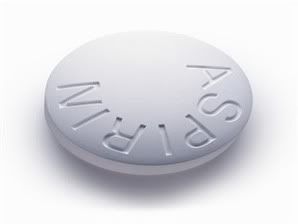London - Low-dose aspirin can reduce a quarter of cases of colon cancer, which is the third cause of death.
Some degree, experts say that the side effects of aspirin is a form of bleeding problems and stomach pains are worrying for people who are not at high risk of cancer to take the drug for reasons to prevent the disease.
Previous studies have found a daily dose of at least 500 milligrams of aspirin may prevent colon cancer. But side effects such as high doses that exceed the benefits. Now researchers say that low-dose, equivalent dose aspirin baby or regular, is also helpful.
European researchers see the results of four experiments over the past 20 years involving more than 14,000 people. The experiment was originally conducted to study the use of aspirin in preventing stroke.

Conclusion: low doses of aspirin can reduce colon cancer indicate that the drug is inching toward the way use for cancer prevention, although people do not have to start taking aspirin every day without consulting their doctor.
Research using baby aspirin to Europe as much as 75 milligrams and 300 milligrams of aspirin regularly. In the United States. baby aspirin for 81 milligrams, while regular aspirin weighing 325 mg.
If using long-term high-dose, aspirin can irritate the stomach, intestines, and cause injury and major bleeding. Some researchers say the drug will only benefit certain people.
"Every person with risk factors such as family history (colorectal cancer) or previous polyps, should really take an aspirin," said Peter Rothwell, a professor at Oxford University and co-author of the paper. "The findings also provide 'tips the balance' for anyone who consider aspirin to prevent heart attacks and strokes," he said.
There is no special funding to research published online in the journal Lancet on Friday (22/10). Rothwell and some other writers are paid to work with some drug manufacturers that make anti-clotting drugs like aspirin.
The trial was analyzed in the Lancet, before the widespread introduction of screening tests such as sigmoidoscopies and colonoscopies, to avoid the possibility someone had died from colon cancer from about 40% to 70% of cases.
Rothwell said, taking aspirin will still be helpful, because the drug seems to stop the cancer in the upper intestine, which usually are not caught by the screening test.
The study compared people who took low doses of aspirin with those taking placebo or not eating at all. Researchers followed the patients for almost 20 years and observe those who have cancer by examining the cancer registries and death certificates in England and Sweden, where the study conducted.
Of the 8282 people taking low dose aspirin, 119 died of colorectal cancers. Among the 5751 people who took a placebo or not taking aspirin, as many as 121 people died of this disease.
The scientists think aspirin works by stopping the production of certain enzymes associated with cancer, including people with stomach cancer, breast, esophagus, and colon.
Other experts cautioned the public against the use of aspirin. "It's not for everybody," said Robert Benamouzig, from Avicenne Hospital in Bobigny, France, who co-wrote a commentary in Lancet.
He said that he would suggest some high-risk patients to take aspirin, but only after explaining the side effects.
Colon cancer is the second most common cancer in developed countries. There are approximately one million new cases and 600,000 deaths worldwide each year due to this disease. The average person has about 5% chance of developing this disease in their lives. [Mor]
